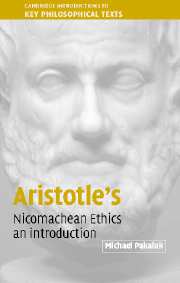Book contents
- Frontmatter
- Contents
- Preface
- 1 Reading Aristotle's Nicomachean Ethics
- 2 The goal of human life (Nicomachean Ethics, book 1)
- 3 Character-related virtue (Nicomachean Ethics 1.13 and book 2)
- 4 Actions as signs of character (Nicomachean Ethics 3.1–5)
- 5 Some particular character-related virtues (Nicomachean Ethics 3.6–4.9)
- 6 Justice as a character-related virtue (Nicomachean Ethics, book 5)
- 7 Thinking-related virtue (Nicomachean Ethics, book 6)
- 8 Akrasia, or failure of self-control (Nicomachean Ethics 7.1–10)
- 9 Friendship (Nicomachean Ethics, books 8 and 9)
- 10 Pleasure (Nicomachean Ethics 7.11–14 and 10.1–5)
- 11 Happiness (Nicomachean Ethics 10.6–9)
- References
- Index
8 - Akrasia, or failure of self-control (Nicomachean Ethics 7.1–10)
Published online by Cambridge University Press: 05 June 2012
- Frontmatter
- Contents
- Preface
- 1 Reading Aristotle's Nicomachean Ethics
- 2 The goal of human life (Nicomachean Ethics, book 1)
- 3 Character-related virtue (Nicomachean Ethics 1.13 and book 2)
- 4 Actions as signs of character (Nicomachean Ethics 3.1–5)
- 5 Some particular character-related virtues (Nicomachean Ethics 3.6–4.9)
- 6 Justice as a character-related virtue (Nicomachean Ethics, book 5)
- 7 Thinking-related virtue (Nicomachean Ethics, book 6)
- 8 Akrasia, or failure of self-control (Nicomachean Ethics 7.1–10)
- 9 Friendship (Nicomachean Ethics, books 8 and 9)
- 10 Pleasure (Nicomachean Ethics 7.11–14 and 10.1–5)
- 11 Happiness (Nicomachean Ethics 10.6–9)
- References
- Index
Summary
By the end of book 6 Aristotle has completed his examination of the virtues, both the virtues of the non-rational part of the soul that is responsive to reason (books 3–6) and those of the rational part of the soul (book 6). One would think that, at this point, he would be in a position to bring his investigation in the Ethics to an end. He had said (in book 1) that the ultimate goal of human life is some activity, or activities, of the sort that we can carry out through having the virtues. With a view to determining this, he identified and described the various virtues. Should he not now simply make a decision on this matter? Yet he does not attempt to do so until book 10, chapter 6.
For the moment, Aristotle puts on hold his search for happiness, in order to discuss three topics which he regards as closely related: pleasure, friendship, and akrasia. He discusses pleasure (7.11–14; 10.1–5), because he wishes to argue that happiness is the most pleasant as well as the best good. Friendship (books 8 and 9) is important, because relationships involving friendship are the ordinary context in which good persons exercise their virtue; moreover, since human beings are social animals, human happiness will be essentially social and therefore something that must be shared among friends, if possessed at all.
- Type
- Chapter
- Information
- Aristotle's Nicomachean EthicsAn Introduction, pp. 233 - 256Publisher: Cambridge University PressPrint publication year: 2005



